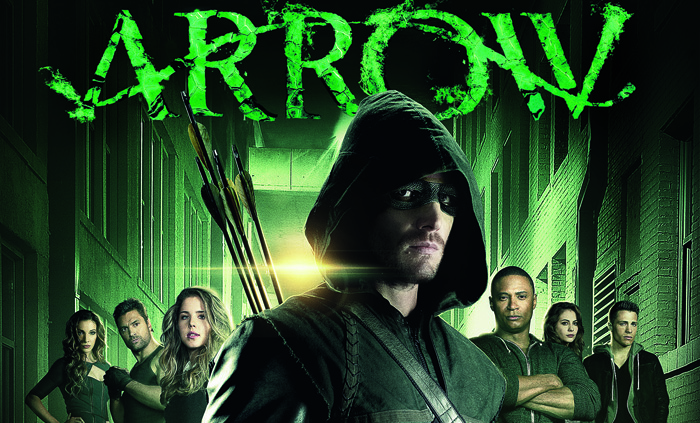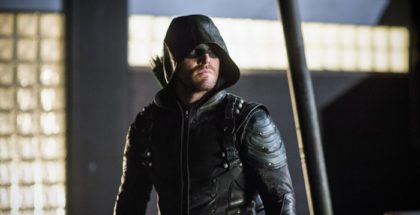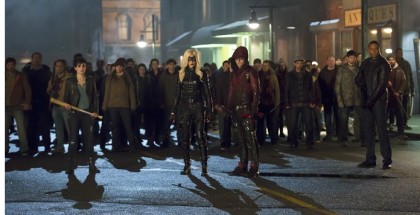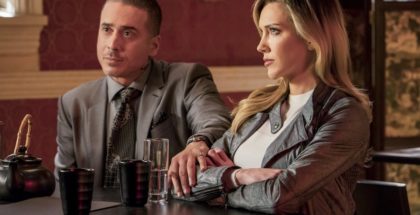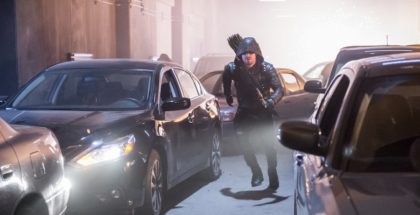Amazon Prime Video UK TV review: Arrow Season 2
Review Overview
Action
10Ambition
9Soap opera
8Matthew Turner | On 23, Sep 2014
Warning: This includes minor spoilers.
“My name is Oliver Queen. After five years on a hellish island, I have come home with only one goal: to save my city. But to do so, I can’t be the killer I once was. To honour my friend’s memory, I must be someone else. I must be something else.”
That’s the reworded pre-episode set-up for the superb second season of Arrow, which boldly announces just how far the show has evolved in the course of its first season and the direction it intends to take. Most notably, it puts the show’s most complex thematic issue front and centre: Oliver’s new-found resolution not to kill, a resolution that will be sorely tested over the course of Season 2.
The second season is also about Oliver’s continued evolution into Green Arrow, the DC comics character the series is based on. More accurately, the second season is concerned with Oliver’s transformation from vengeance-fuelled vigilante (nicknamed The Vigilante or The Hood by Paul Blackthorne’s Detective Lance) to full-on superhero, with Oliver deciding early on that he’d like to be known as The Arrow, in part to distance himself from “the killer I once was”. He even gets a proper mask this season and everything, which is just as well, because all that eye shadow he was using in Season 1 must have taken ages to put on.
The first episode does a great job of setting out the direction for the season overall. After the defeat of Malcolm Merlyn (John Barrowman) in last season’s explosive finale, Oliver’s (Stephen Amell) revenge quest is over. Haunted by the death of best friend Tommy Merlyn (who died having accused Oliver of being a cold-blooded murderer and no better than a serial killer), Olly retreats to the hellish island (hereafter known as Flashback Island) and considers giving up the vigilante game altogether, but a visit from Team Arrow (David Ramsey’s John Diggle and Emily Bett Rickards’ Felicity Smoak) pulls him out of it, convincing him that Starling City still needs him, not least because a bunch of Hood-inspired outlaws are terrorising the populace. Episode 1 also jumps straight in with a brief glimpse of another important figure in Season 2: a black-clad, battle-stave-equipped female vigilante (The Machine’s Caity Lotz), instantly recognisable to comic fans as Black Canary (though, just as the show isn’t quite ready for the green in “Green Arrow”, it ditches the black and just calls her “The Canary”).
With Malcolm supposedly dead, the show needs a new season-long adversary and here Season 2 pulls off an impressive fake-out: for the first half of, the bad guy is established as Alderman Sebastian Blood (Kevin Alejandro), who is running for Mayor (and is friends with Oliver) but is secretly trying to develop a race of super-soldiers under his super-villain identity of Brother Blood (complete with scary-looking skull mask). However, we soon discover the season’s true villain: a revenge-obsessed figure from Olly’s past – which gives the flashback sequences the intriguing task of filling in the gaps of the past five years.
One of Arrow’s many strengths is its ability to balance thrilling superhero action (the fight choreography remains exceptional throughout) with such emotionally gripping soap opera elements. While the soapier aspects of Season 1 were less successful – notably the damp squib love triangle between Oliver, Laurel and Tommy – Season 2 fires on all cylinders, not least because the screenwriters have accorded each character enough depth so that we genuinely care about them, all of which is heightened by top notch performances across the board.
Accordingly, this season’s sub-plots include: the continuing relationship between Thea Queen (Willa Holland) and Roy Harper (Colton Haynes), who, in turn, grows closer to fulfilling his comics-ordained role as Green Arrow’s sidekick; Moira Queen’s (Susanna Thompson) trial for her part in The Undertaking; Moira’s subsequent struggle to repair her relationships with both Oliver and Thea; Laurel Lance’s (Katie Cassidy) spiral into substance abuse after the death of boyfriend Tommy; the attempted takeover of Queen Consolidated by mysterious businesswoman Isabel Rochev (whom you immediately know is set to be important because she’s played by Summer Glau); and finally the shifting sands of Oliver’s love life, each development of which is met with a lovestruck glance and a snappy comment from a clearly smitten Felicity (the producers are obviously aware of how badly a certain element of the show’s audience wants these two to get together).
As a side note, one enjoyable factor is the way it deals with the issue of Oliver’s secret identity – to be honest, it’s getting difficult to tell who knows and who doesn’t without a spreadsheet. This is frequently commented upon (Oliver freaks out when Barry Allen is let in on the secret without his say-so), but it’s a sign that the show recognises the ridiculousness of, say, Detective Lance still not realising he is The Arrow, even though he knows who The Canary is.
As for Flashback Island, the key revelation (which has great potential going forward) is that Oliver did not, in fact, spend all five years of his absence there. This season’s backstory sequences may not reflect and comment on the present-day action as efficiently as they did in Season 1, but they provide an emotionally devastating central set-piece that is cleverly echoed later on, as well as building to a brilliantly directed and edited final battle that unfolds in tandem with the present-day action, only with a crucially different pay-off. We also meet DC’s genuinely chilling mad scientist Doctor Ivo (Dylan Neal), whose experiments with super-serum Mirakuru will have huge consequences.
The introduction of the serum is significant, because it represents a significant change in the show’s comic-book make-up: whereas Season 1 was happy to introduce plenty of characters from the DC universe, it was careful not to include anyone with actual super-powers. Now, with Mirakuru giving super-strength, invulnerability, healing powers and super-speed, Starling City is very definitely a place where people with powers exist. Which is handy, because the CW network are about to debut a show based on costume-clad speedster The Flash – whose alter-ego Barry Allen (Grant Gustin) pops up in two episodes – and there are likely to be several crossovers.
Elsewhere, Arrow continues its fan-pleasing track record of bringing in famous characters: guest villains this season include The Clock King (Robert Knepper), Shrapnel (Sean Maher) and The Dollmaker (Michael Eklund) and there’s even, delightfully, a cameo of sorts for Harley Quinn. The show also continues to play intriguing games with the names it chooses to drop, most notably Batman villain Ra’s Al Ghul, in a strongly hinted set-up for main adversary in Season 3. Similarly, the show also has a lot of fun teasing various other properties in the titles, such as Birds of Prey and Suicide Squad, in a manner that vaguely recalls the way Smallville began assembling members of the Justice League in Season 6.
All in all, with its skilful blending of heroic action and powerful character drama, Arrow has proven itself a production that knows exactly the kind of show it wants to be and its confidence and sense of ambition are genuinely thrilling to watch. The writing, in particular, is exceptional, giving equal weight to each of its growing cast and exploring some compelling central themes, while also pulling off some properly shocking twists along the way. In short, its stellar second season has elevated Arrow into one of the best shows currently on TV, leaving audiences rightly breathless with excitement for the prospect of Season 3.
Season 1 to 4 of Arrow are available on Amazon Prime Video, as part of a £5.99 monthly subscription – or, for free next day UK delivery on Amazon items, as part of a £79 annual Prime membership.


